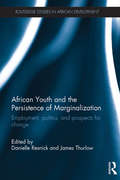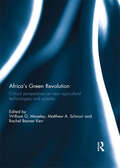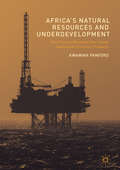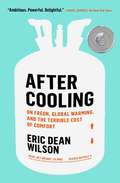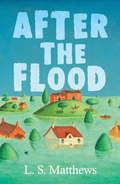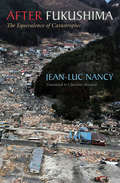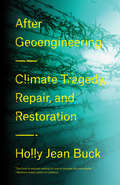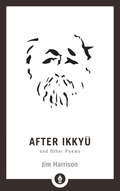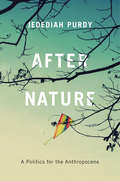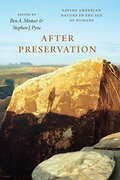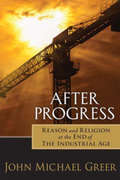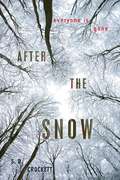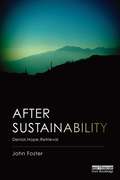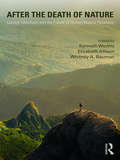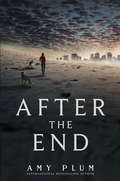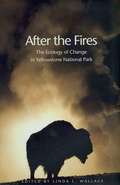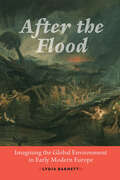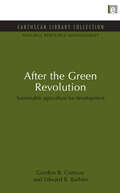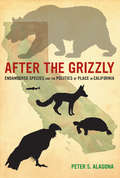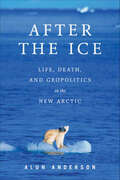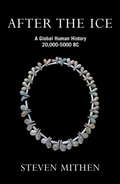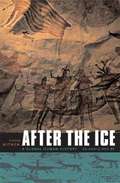- Table View
- List View
African Youth and the Persistence of Marginalization: Employment, politics, and prospects for change (Routledge Studies in African Development)
by Danielle Resnick James ThurlowThe much heralded growth and transformation of many economies in sub-Saharan Africa over the last decade continues to receive prominent attention in academic scholarship and among policy practitioners. An apparent feature about this transformation, however, is that Africa’s youth appear to have been left out. This book critically examines the extent and consequences of the marginalization of African youth. It questions conventional wisdoms about data trends, aspirational goals, and common policy interventions surrounding Africa’s youth that have been variously propagated in both the development studies literature and in mainstream donor policy reports. The book explores macro trends from both a temporal and cross-regional perspective in order to highlight what is distinct about contemporary African youth and whether their prospects and behaviours do actually vary from their counterparts in other regions of the world or from previous generations of African youth. Such studies include cross-country analyses of youth employment patterns and modes of political participation, in-depth examination of the behaviours and aspirations of the urban youth, and critical reflections on the impact of rural employment initiatives, vocational education, and learnership programmes. The incorporation of multiple methods and disciplines, as well as its attention to policy issues, ensures that the book will be of great interest to graduate students, researchers, and professional researchers whose work lies at the intersection of African area studies and development studies as well as those focused on development economics, political science, and public policy and administration.
Africa’s Green Revolution: Critical Perspectives on New Agricultural Technologies and Systems
by William G. Moseley, Matthew A. Schnurr and Rachel Bezner KerrThis volume examines the dominant neoliberal agenda for agricultural development and hunger alleviation in Africa. The text reviews the history of African agricultural and food security policy in the post-colonial period, across a range of geographical contexts, in order to contextualise the productionist approach embedded in the much heralded New Green Revolution for Africa. This strategy, supported by a range of international agencies, promotes the use of hybrid seeds, fertilisers, and pesticides to boost crop production. This approach is underpinned by a new and unprecedented level of public–private partnerships as donors actively work to promote the private sector and build links between African farmers, input suppliers, agro-dealers, agro-processors, and retailers. On the consumer end, increased supermarket penetration into poorer neighbourhoods is proffered as a solution to urban food insecurity. The chapters in this volume complicate understandings of this new approach and raise serious questions about its effectiveness as a strategy for increasing food production and alleviating poverty across the continent.This book is based on a special issue of African Geographical Review.
Africa’s Natural Resources and Underdevelopment: How Ghana’s Petroleum Can Create Sustainable Economic Prosperity
by Kwamina PanfordThis book explores how African countries can convert their natural resources, particularly oil and gas, into sustainable development assets. Using Ghana, one of the continent's newest oil-producing countries, as a lens, it examines the "resource curse" faced by other producers - such as Nigeria, Angola, and Equatorial Guinea - and demonstrates how mismanagement in those countries can provide valuable lessons for new oil producers in Africa and elsewhere. Relying on a broad range of fieldwork and policymaking experience, Panford suggests practical measures for resource-rich developing countries to transform natural resources into valuable assets that can help create jobs, boost human resources, and improve living and working conditions in Ghana in particular. He suggests fiscal, legal, and environmental antidotes to resource mismanagement, which he identifies as the major obstacle to socioeconomic development in countries that have historically relied on natural resources.
After Cooling: On Freon, Global Warming, and the Terrible Cost of Comfort
by Eric Dean WilsonThis dazzlingly original work of literary nonfiction interweaves the science and history of the powerful refrigerant (and dangerous greenhouse gas) Freon with a haunting meditation on how to live meaningfully and morally in a rapidly heating world.In After Cooling, Eric Dean Wilson braids together air-conditioning history, climate science, road trips, and philosophy to tell the story of the birth, life, and afterlife of Freon, the refrigerant that ripped a hole larger than the continental United States in the ozone layer. As he traces the refrigerant&’s life span from its invention in the 1920s—when it was hailed as a miracle of scientific progress—to efforts in the 1980s to ban the chemical (and the resulting political backlash), Wilson finds himself on a journey through the American heartland, trailing a man who buys up old tanks of Freon stockpiled in attics and basements to destroy what remains of the chemical before it can do further harm. Wilson is at heart an essayist, looking far and wide to tease out what particular forces in American culture—in capitalism, in systemic racism, in our values—combined to lead us into the Freon crisis and then out. It&’s a story that offers a rare glimpse of environmental hope, suggesting that maybe the vast and terrifying problem of global warming is not beyond our grasp to face.
After The Flood
by L.S. MatthewsSet in a future where the effects of climate change begin to take hold, the story follows Jack and Michael as they try to cope with a new existence.After a dramatic escape from the approaching floods, Jack and his family relocate to the country, where they meet Michael, ill and cared for by his sister. United by their love for horses, Jack and Michael hatch a plan to save a wild young horse from destruction. But they're in for a rough ride ...Warm and full of heart, this is a hugely enjoyable story with a thought-provoking twist in its tail.
After Fukushima: The Equivalence of Catastrophes
by Jean-Luc NancyThe renowned philosopher offers &“a powerful reflection on our times . . . and the fate of our civilization, as revealed by the catastrophe of Fukushima&” (François Raffoul, Louisiana State University). In 2011, a tsunami flooded Japan&’s Fukushima Daiichi Nuclear Power Plant, causing three nuclear meltdowns, the effects of which will spread through generations and have an impact on all living things. In After Fukushima, philosopher Jean-Luc Nancy examines the nature of catastrophes in the era of globalization and technology. He argues that in today&’s interconnected world, the effects of any disaster will spread in the way we currently associate only with nuclear risk. Can a catastrophe be an isolated occurrence? Is there such a thing as a &“natural&” catastrophe when all of our technologies—nuclear energy, power supply, water supply—are necessarily implicated, drawing together the biological, social, economic, and political? In this provocative and engaging work, Nancy examines these questions and more. Exclusive to this English edition are two interviews with Nancy conducted by Danielle Cohen-Levinas and Yuji Nishiyama and Yotetsu Tonaki.
After Geoengineering: Climate Tragedy, Repair, and Restoration
by Holly Jean BuckWhat if the people seized the means of climate production?Climate engineering is a dystopian project. But as the human species hurtles ever faster towards its own extinction, geoengineering as a temporary fix, to buy time for carbon removal, is a seductive idea. We are right to fear that geoengineering will be used to maintain the status quo, but is there another possible future after geoengineering? Can these technologies and practices be used as technologies of repair, to bring carbon levels back down to pre-industrial levels? Are there possibilities for massive intentional intervention in the climate that are democratic, decentralized, or participatory? Is there a scenario where the people can define and enact geoengineering on our own terms? These questions are provocative, because they go against a binary that has become common sense: geoengineering is assumed to be on the side of industrial agriculture, inequality and ecomodernism, in opposition to degrowth, renewable energy, sustainable agriculture and climate justice. After Geoengineering rejects this binary, to ask: what if the people seized the means of climate production? Both critical and utopian, the book examines the possible futures after geoengineering. Rejecting the idea that geoengineering is some kind of easy work-around, Holly Buck outlines the kind of social transformation that would be necessary to enact a programme of geoengineering in the first place.
After Greenwashing
by Frances BowenBusinesses promote their environmental awareness through green buildings, eco-labels, sustainability reports, industry pledges and clean technologies. When are these symbols wasteful corporate spin, and when do they signal authentic environmental improvements? Based on twenty years of research, three rich case studies, a strong theoretical model and a range of practical applications, this book provides the first systematic analysis of the drivers and consequences of symbolic corporate environmentalism. It addresses the indirect cost of companies' symbolic actions and develops a new concept of the 'social energy penalty' - the cost to society when powerful corporate actors limit the social conversation on environmental problems and their solutions. This thoughtful book develops a set of tools for researchers, regulators and managers to separate useful environmental information from empty corporate spin, and will appeal to researchers and students of corporate responsibility, corporate environmental strategy and sustainable business, as well as environmental practitioners.
After Ikkyu and Other Poems: And Other Poems
by Jim HarrisonA spirited collection of poems inspired by the Zen practice of one of America's most celebrated authors, Jim Harrison, a New York Times best-selling author.The popular novels of Jim Harrison (1937–2016) represent only part of his literary output—he was also widely acclaimed for the “renegade genius” of his powerful, expressive poems. After Ikkyū is the first collection of Harrison’s poetry directly inspired by his many years of Zen practice. The writing here is at once thought-provoking and passionate, immortalizing a celebrated American writer’s relationship to Zen in beautiful verse. These short, spirited poems will inspire you to look at life differently with a newfound sense of wonder and gratitude for everyday moments.
After Nature: A Politics for the Anthropocene
by Jedediah PurdyNature no longer exists apart from humanity. The world we will inhabit is the one we have made. Geologists call this epoch the Anthropocene, Age of Humans. The facts of the Anthropocene are scientific--emissions, pollens, extinctions--but its shape and meaning are questions for politics. Jedediah Purdy develops a politics for this post-natural world.
After Nature: A Politics for the Anthropocene
by Jedediah PurdyNature no longer exists apart from humanity. Henceforth, the world we will inhabit is the one we have made. Geologists have called this new planetary epoch the Anthropocene, the Age of Humans. The geological strata we are now creating record industrial emissions, industrial-scale crop pollens, and the disappearance of species driven to extinction. Climate change is planetary engineering without design. These facts of the Anthropocene are scientific, but its shape and meaning are questions for politics - a politics that does not yet exist. After Nature develops a politics for this post-natural world.
After Preservation: Saving American Nature in the Age of Humans
by Ben A. Minteer Stephen J. PyneFrom John Muir to David Brower, from the creation of Yellowstone National Park to the Endangered Species Act, environmentalism in America has always had close to its core a preservationist ideal. Generations have been inspired by its ethos--to encircle nature with our protection, to keep it apart, pristine, walled against the march of human development. But we have to face the facts. Accelerating climate change, rapid urbanization, agricultural and industrial devastation, metastasizing fire regimes, and other quickening anthropogenic forces all attest to the same truth: the earth is now spinning through the age of humans. After Preservation takes stock of the ways we have tried to both preserve and exploit nature to ask a direct but profound question: what is the role of preservationism in an era of seemingly unstoppable human development, in what some have called the Anthropocene? Ben A. Minteer and Stephen J. Pyne bring together a stunning consortium of voices comprised of renowned scientists, historians, philosophers, environmental writers, activists, policy makers, and land managers to negotiate the incredible challenges that environmentalism faces. Some call for a new, post-preservationist model, one that is far more pragmatic, interventionist, and human-centered. Others push forcefully back, arguing for a more chastened and restrained vision of human action on the earth. Some try to establish a middle ground, while others ruminate more deeply on the meaning and value of wilderness. Some write on species lost, others on species saved, and yet others discuss the enduring practical challenges of managing our land, water, and air. From spirited optimism to careful prudence to critical skepticism, the resulting range of approaches offers an inspiring contribution to the landscape of modern environmentalism, one driven by serious, sustained engagements with the critical problems we must solve if we--and the wild garden we may now keep--are going to survive the era we have ushered in. Contributors include: Chelsea K. Batavia, F. Stuart (Terry) Chapin III, Norman L. Christensen, Jamie Rappaport Clark, William Wallace Covington, Erle C. Ellis, Mark Fiege, Dave Foreman, Harry W. Greene, Emma Marris, Michelle Marvier, Bill McKibben, J. R. McNeill, Curt Meine, Ben A. Minteer, Michael Paul Nelson, Bryan Norton, Stephen J. Pyne, Andrew C. Revkin, Holmes Rolston III, Amy Seidl, Jack Ward Thomas, Diane J. Vosick, John A. Vucetich, Hazel Wong, and Donald Worster.
After Progress: Reason and Religion at the End of the Industrial Age
by John Michael GreerThe acclaimed climate futurist examines our unquestioning faith in progress, and its limits in the face of peak oil and climate change. Since the Industrial Age began, scientific and technological progress has been nothing short of miraculous. As a result, progress itself has become the new religion of the West. Our faith in it is so complete that many of us ignore the perils of peak oil and climate change, believing that our lab-coated high priests will surely bring forth yet another miracle to save us all. Unfortunately, progress as we've known it has been entirely dependent on the breakneck exploitation of half a billion years of stored sunlight in the form of fossil fuels. As the age of this cheap, abundant energy draws to a close, progress is grinding to a halt. Unforgiving planetary limits are teaching us that our blind faith in endless exponential growth is a dangerous myth.After Progress addresses this looming paradigm shift, exploring the shape of history from a perspective on the far side of the coming crisis. With a startling examination of the role our belief systems play in our collective fate, John Michael Greer makes a persuasive argument for seeking new sources of meaning, value, and hope for the era ahead.
After The Snow (After The Snow #1)
by S. D. CrockettThe oceans stopped working before Willo was born, so the world of ice and snow is all he's ever known. He lives with his family deep in the wilderness, far from the government's controlling grasp. Willo's survival skills are put to the test when he arrives home one day to find his family gone. It could be the government; it could be scavengers--all Willo knows is he has to find refuge and his family. It is a journey that will take him into the city he's always avoided, with a girl who needs his help more than he knows.
After Sustainability: Denial, Hope, Retrieval
by John FosterDangerous climate change is coming. Some people still deny that it is happening. Others refuse to recognise that it is now too late to prevent it. But both these reactions spring from the same source: our pathological attachment to ‘progress’, of which sustainability has been one more version. After Sustainability traces that attachment to its roots in the ways we make sense of ourselves. Original and accessible, this is philosophy on the edge, written for anyone who glimpses our environmental tragedy and cares about our future. Does the challenge to stop pretending offer our only remaining chance? Read this book and make up your own mind.
After the Death of Nature: Carolyn Merchant and the Future of Human-Nature Relations
by Kenneth Worthy Elizabeth Allison Whitney A. BaumanCarolyn Merchant’s foundational 1980 book The Death of Nature: Women, Ecology, and the Scientific Revolution established her as a pioneering researcher of human-nature relations. Her subsequent groundbreaking writing in a dozen books and over one hundred peer-reviewed articles have only fortified her position as one of the most influential scholars of the environment. This book examines and builds upon her decades-long legacy of innovative environmental thought and her critical responses to modern mechanistic and patriarchal conceptions of nature and women as well as her systematic taxonomies of environmental thought and action. Seventeen scholars and activists assess, praise, criticize, and extend Merchant’s work to arrive at a better and more complete understanding of the human place in nature today and the potential for healthier and more just relations with nature and among people in the future. Their contributions offer personal observations of Merchant’s influence on the teaching, research, and careers of other environmentalists.
After the End
by Amy PlumMichael Grant's Gone series meets M. Night Shyamalan's The Village in this riveting story of one girl's journey to save the very people who have lied to her for her entire life. Amy Plum, internationally bestselling author of the Die for Me series, delivers a fast-paced adventure perfect for fans of Marie Lu and Robison Wells.Juneau grew up fearing the outside world. The elders told her that beyond the borders of their land in the Alaskan wilderness, nuclear war had destroyed everything. But when Juneau returns from a hunting trip one day and discovers her people have been abducted, she sets off to find them. And leaving the boundaries for the very first time, she learns the horrifying truth: World War III never happened. Nothing was destroyed. Everything she'd ever been taught was a lie.As Juneau comes to terms with an unfathomable deception, she is forced to survive in a completely foreign world, using only the skills and abilities she developed in the wild. But while she's struggling to rescue her friends and family, someone else is after her. Someone who knows the extraordinary truth about her secret past.
After the Fires: The Ecology of Change in Yellowstone National Park
by Linda L. WallacePlant and fire ecologist Wallace (U. of Oklahoma) provides a comprehensive scientific summary of the effects of the dramatic fires that tore across Wyoming and Montana in 1988. Even before the ashes had cooled, scientists from many disciplines began research, asking critical questions about the extent and intensity of the fires and initiating studies to determine the effects on geology, hydrology, plant and animal ecology, aquatic ecosystems, and landscape and ecosystem structure and function. The collection shows that the largest effects were found to have been felt at the smallest scales, and that the long-term devastation that had been predicted did not come to pass. Annotation ©2004 Book News, Inc. , Portland, OR (booknews. com)
After the Flood: Imagining the Global Environment in Early Modern Europe
by Lydia BarnettHow the story of Noah's Flood was central to the development of a global environmental consciousness in early modern Europe.Winner of the Morris D. Forkosch Prize by the Journal of the History of Ideas, Short-listed for the Kenshur Prize by the Center for Eighteenth-Century Studies, Indiana UniversityMany centuries before the emergence of the scientific consensus on climate change, people began to imagine the existence of a global environment: a natural system capable of changing humans and of being changed by them. In After the Flood, Lydia Barnett traces the history of this idea back to the early modern period, when the Scientific Revolution, the Reformations, the Little Ice Age, and the overseas expansion of European empire, religion, and commerce gave rise to new ideas about nature and humanity, and their intersecting histories. Recovering a forgotten episode in the history of environmental thought, Barnett brings to light the crucial role of religious faith and conflict in fostering new ways of thinking about the capacity of humans and nature to change each other on a planetary scale. In the hands of Protestant and Catholic writers from across Europe and its American colonies, the biblical story of Noah's Flood became a vehicle for imagining the power of sin to wreck the world, the dangers of overpopulation, the transformative effects of shifting landforms on the course of human history, and the impact of a changing climate on human bodies, health, and lives. Following Noah's Flood as a popular topic of debate through long-distance networks of knowledge from the late sixteenth through the early eighteenth centuries, Barnett reveals how early modern earth and environmental sciences were shaped by gender, evangelism, empire, race, and nation. After the Flood illuminates the hidden role and complicated legacy of religion in the emergence of a global environmental consciousness.
After the Green Revolution: Sustainable Agriculture for Development (Natural Resource Management Set)
by Edward B. Barbier Gordon R. Conway'The Green Revolution' of the 60's and 70's produced immense gains in food cereal production in the Third World. But there are huge problems in the 'post-revolutionary' era: farmers with small or marginal holdings have benefited less than wealthier farmers; intensive mono-cropping has made production more susceptible to environmental stresses and shocks. Now there is evidence of diminishing returns from intensive and intensively chemical agricultural production. What is needed is a new approach, equally revolutionary, but different in its ideas and style. The authors set out what they mean by 'sustainable' agriculture in the new era and look at the effects of international economic restraints and of national policies on the kind of development they see as necessary. They chart a path for sustainable livelihoods for Third World farmers enmeshed by forces outside their control. They describe methods of evaluating and resolving the tough trade-offs all levels of intervention, from international trade down to the individual farm. This book cannot provide all the answers, but it does indicate what international conditions we need to be aware of, what national policies we need to advocate and what approaches at the local level we need to adopt to ensure the goal of agricultural sustainability. Originally published in 1990
After the Grizzly: Endangered Species and the Politics of Place in California
by Peter S. AlagonaThoroughly researched and finely crafted, After the Grizzly traces the history of endangered species and habitat in California, from the time of the Gold Rush to the present. Peter S. Alagona shows how scientists and conservationists came to view the fates of endangered species as inextricable from ecological conditions and human activities in the places where those species lived. Focusing on the stories of four high-profile endangered species--the California condor, desert tortoise, Delta smelt, and San Joaquin kit fox--Alagona offers an absorbing account of how Americans developed a political system capable of producing and sustaining debates in which imperiled species serve as proxies for broader conflicts about the politics of place. The challenge for conservationists in the twenty-first century, this book claims, will be to redefine habitat conservation beyond protected wildlands to build more diverse and sustainable landscapes.
After the Ice: Life, Death, and Geopolitics in the New Arctic
by Alun AndersonNew from Smithsonian Books, After the Ice is an eye-opening look at the winners and losers in the high-stakes story of Arctic transformation, from nations to native peoples to animals and the very landscape itself. Author Alun Anderson explores the effects of global warming amid new geopolitical rivalries, combining science, business, politics, and adventure to provide a fascinating narrative portrait of this rapidly changing land of unparalleled global significance.
After the Ice: A Global Human History, 20,000 - 5000 BC
by Prof Steven MithenA fantastic voyage through 15,000 years of history that laid the foundations for civilisation as we know it by award-winning science writer Steven Mithen.Twenty thousand years ago Earth was in the midst of an ice age. Then global warming arrived, leading to massive floods, the spread of forests and the retreat of the deserts. By 5,000 BC a radically different human world had appeared. In place of hunters and gatherers there were farmers; in place of transient campsites there were towns. The foundations of our modern world had been laid and nothing that came after - the Industrial Revolution, the atomic age, the internet - have ever matched the significance of those events. AFTER THE ICE tells the story of climate change's impact during this momentous period - one that also saw the colonisation of the Americas and mass extinctions of animals throughout the world. Drawing on the latest cutting-edge research in archaeology, cognitive science, palaeontology, geology and the evolutionary sciences, Steven Mithen creates an evocative, original and remarkably complete picture of minds, cultures, lives and landscapes through 15,000 years of history.
After the Ice: A Global Human History 20,000-5000 BC
by Steven MithenArchaeology says present day humans have been on the planet for eighty thousand years. The first writing has been dated to 3,500 BC. This is what humanity may have been during from 20,000 to 5,000 BC, during the period of global warming which followed the last great ice age. The author uses archaeology to talk about humans at various times during this period of time and at various places on the planet. This book is about what life may have been like day to day over a fifteen thousand year period before we learned to write and live in cities.
